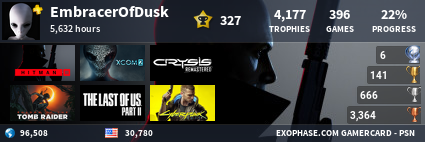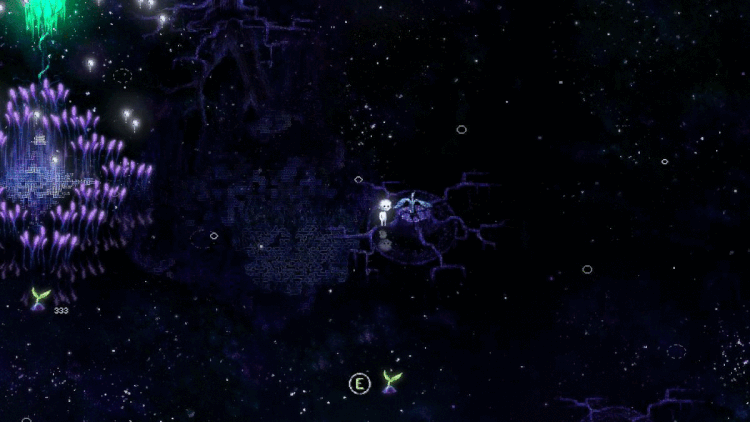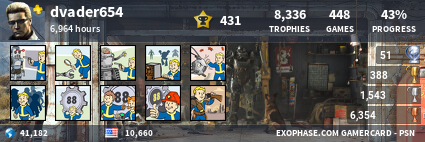I don't think people have a choice. I mean, you buy a console and you want to be able to buy games for it for a long time. And it doesn't really matter what is happening in the PC space because of the relative high cost and complexity factor PCs have, which scare off the man who just wants to be able to plug and play a console.
And also, the support is there from software companies for consoles which get console and PC games, the library is usually a bit better too.
I do think that we have come to a point where the new consoles graphics will have a harder time showing a huge difference. Sure you can do Agni's Philosyphy realtime cutscene on a mid-range PC, but a mid-range PC still costs a lot more than your average console and making a game like that would take years and huge resources.
Even if you take the best looking PC game on the best PC at this moment the real time games would not blow you away like it was 1996. New consoles are going to cost a third as much as that most expensive PC and thus the graphics level should be theoretically lower.

It doesn't cost THAT much to build a high end PC.
When I built mine in 2008, it cost me around $1500...totally from scratch. And it was a complete beast at the time...I could have went lower & still outdid the consoles. Since then, I've upgraded my graphics card (because my old one died on me) and added a Sound Card..everything else is the same, and its still a beast. Plus, you can typically get much better deals on games on the PC, and the online is free.
If Sony & MS were going to continue the high price console strategy, I could see the PC gaining a lot more popularity as a gaming machine. But that's the question...will they, or are we going back to $300 consoles at launch?

I mean the cost in comparison to consoles. PS3 was $599 and considered really expensive at the time. To make an absolute top spec gaming PC costs a lot more than that and I don't see new consoles making the $599 mistake again. So in comparison the money console makers have to work with is notably less, even on the razor model.
And if gamers today are not that bothered about the difference between 360 and a top spec PC, they aren't going to be wowed when the gap slightly closes between them on consoles which are definitely more powerful, yet still only a fraction of top spec PC power.
Humongous change in graphics not the focus for next-gen
Videogamer said:Next-generation consoles won't provide as much of a graphical leap as previous generations have, THQ suggests.THQ's CEO Brian Farrell has suggested that next-generation consoles won't provide as much of a graphical leap as previous generations have, saying that the focus of next-generation hardware is to develop "opportunities in different types of business... rather than a humongous change in the foundation of 3D graphics".
"I think if you look at what's been happening on the PC, the generational change, if you will, as we've moved from DX10 to DX11 hasn't been, to a certain extent, the same impact that previous ones had," said Farrell, replying to a question about rising development costs on next-generation hardware.
"Certainly, when you went from 2D to 3D many, many years ago at the beginning of the PlayStation era, that was a major leap and costs went up significantly. As processors got extremely complex to try to get more and more graphics prowess out of the hardware, the PlayStation 2 jumped with also a massive change.
"I think the transition we're looking at in hardware right now is somewhat different. I think the transition is much more kind of focused around opportunities in different types of business -- different types of distribution, different types of business models, a lot more online, a lot more ability to track and relate to the consumer and things like that rather than a humongous change in the foundation of 3D graphics. So I don't expect costs to jump like they have in the past as we move forward."
Farrell's comments follow those of Mark Rein, who told VideoGamer.com last month that Epic was happy to wait for a 'massive leap' in next-generation console performance.
"[Next gen] is going to come out whenever it comes out," he told us, "and again, the whole do it right versus right now thing, I'd much rather get a massive leap in performance and capabilities than get something today."
Neither Sony or Microsoft have announced their plans for the next-generation.
Microsoft confirmed last night that it was developing a "new Xbox".

---
Tell me to get back to rewriting this site so it's not horrible on mobileYodariquo said:I don't understand your use of Moore's law, which describes the exponential growth of hardware power. You say that it's being proven right. So... shouldn't they be able to get away with it now the same as before, unless you mean PC is getting further and further ahead. Just looking for clarification on what the main point was.
Consoles stay in place for 5 years at a time. Technology advances at a greater and greater rate at a lower cost. Consoles will be increasingly show their age, while PC's will become increasingly trivial to update in cost.
I'm not postulating that this is the case TODAY. Just that it seems inevitable. You could say, look at how far phablet products have come since the Wii U was announced. Meanwhile Nintendo will be stuck with the Wii U they announced in 2011 for the next 5 years.
Same for Vita. It was launched in February and in tech (not in content) it has already been surpassed.
I think content is the key here, (which is why Nintendo is immune to this theory).

The software will go with the consoles. Look at PC gaming, Crysis is probably still the benchmark for graphics and that came out like 5 years ago. PCs are handcuffed by the consoles cause the devs dont want to make a game that cant run on the consoles. As long as the console market is the king it will stay that way.
Dvader said:The software will go with the consoles. Look at PC gaming, Crysis is probably still the benchmark for graphics and that came out like 5 years ago. PCs are handcuffed by the consoles cause the devs dont want to make a game that cant run on the consoles. As long as the console market is the king it will stay that way.
This is a myth.

Dvader said:So the best looking game is?
You said Gears of War 3 was the best looking game last year or whenever it came out. 
So with that in mind: Crysis Warhead>Crysis>>>>>Crysis 2, and a million other games look better than Crysis.

Foolz said:You said Gears of War 3 was the best looking game last year or whenever it came out.
So with that in mind: Crysis Warhead>Crysis>>>>>Crysis 2.
Of what I have played yeah.
Is that a Crysis expansion, so its still Crysis.
Dvader said:Damn your edit. What games look more impressive from a technical standpoint I should say.

Perhaps The Witcher 2? But Crysis might still beat it due to the interactive nature of the graphics.

Foolz said:
Perhaps The Witcher 2? But Crysis might still beat it due to the interactive nature of the graphics.
Answered my comeback.
My bottom line point is that consoles are a snapshot, the rate of technological advancement is a flipbook with an ever increasing number of pages.
Everything about the console model is starting to look out of touch with the way modern electronic consumer products are sold. From the 18 month pre-announce to the stuck-in-time non-upgradable specs, and also the lack of a universal format (and royalties to individual manufacturers).
This generation showed the irrelevance of dedicated software standards. Making games for both HD consoles just cost third parties more, and hamstrung exclusive studios. You think Naughty Dog wouldn't have loved to have sold to the 360 users, or that Epic would have welcomed purchases of Gears from PS3 owners?
It's a broken model.









Looking at how ARM processors can now match current home console performance I was prompted to ponder the topic.
Home consoles have, in the past, been able to sustain reliable generations by launching with hardware specs that are considerably below cutting edge PC specs, but higher than average PC user ownership and making a console with them.
So they can provide an out-of-the-box gaming experience that is better than the average users current PC and incredibly superior to all of their their current console experiences.
They can then hold this reliably for about 5 years.
With Moore's law being increasingly evident, can this development model hold?
The HD console manufacturers don't seem to think so, as they grasp for off the shelf components, with some rumoring that MS is planning for an expanable console.
What do you guys think -- are consoles that stand in time for five years at a time sustainable moving forward?